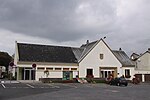The Battle of Bazeilles was fought on 1 September 1870 during the Franco-Prussian War as a portion of the larger Battle of Sedan and was one of the first battles to feature modern urban warfare tactics. It took place in Bazeilles, France, a small village in the department of Ardennes near Sedan, and involved a force of Bavarian soldiers battling against French marines and partisans.
The battle was, in effect, an ambush of the Bavarians (who were allies of the Prussians), by a small detachment of the "Blue Division" Troupes de marine (known also as marsouins), under the command of Élie de Vassoigne. Marsouin snipers, along with local guerrillas, fired on the Bavarian troops using quick-firing Chassepot breech-loading rifles.
Although outnumbered ten to one, the French held the village until Napoleon III gave orders to withdraw. A small group under commander Arsène Lambert remained in the last house on the road to Sedan, the Auberge Bourgerie, fighting to the last bullet in order to cover the retreat.After seven hours of conflict, the Bavarian troops took the village, and the captured Franc-tireur partisans, along with other civilians who were considered unlawful combatants, were later executed.
Later that same day, France suffered crushing defeats at the Battle of Sedan where Napoleon III and his army were captured. Coupled with the loss of another French army at Metz, these battles effectively ended Napoleon III's Empire, ushering in the Third Republic. For several months, people of the new republic saw continued partisan warfare.
General de Vassoigne famously remarked on the French soldiers involved in the battle, "The troupes de marine fought beyond the extreme limits of duty."The anniversary of the Battle of Bazeilles is now celebrated by the Troupes de marine.









